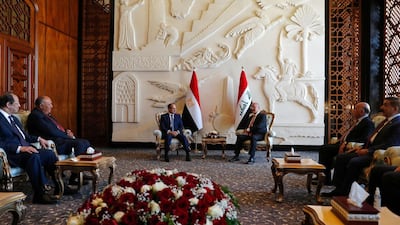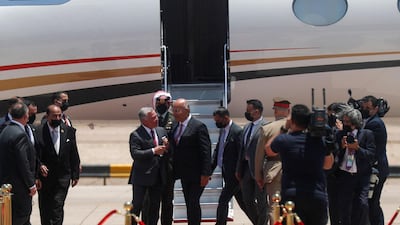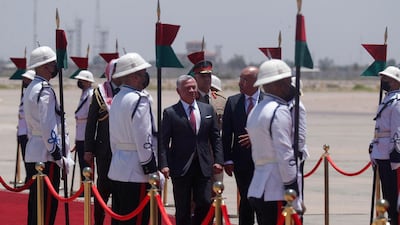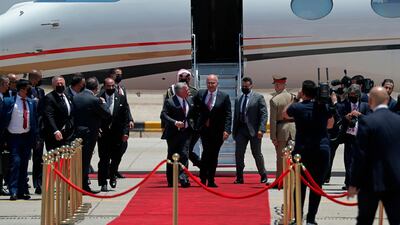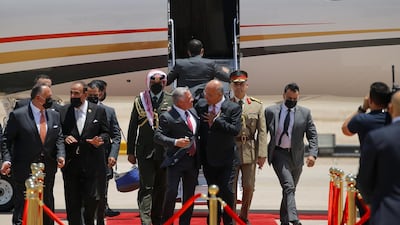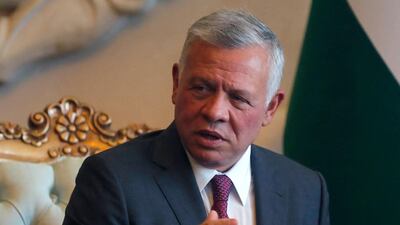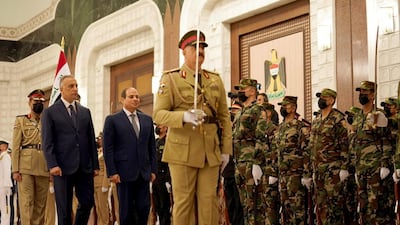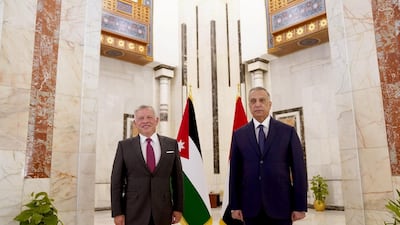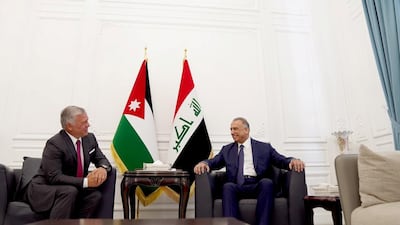Iraq's President Barham Salih met Jordan's King Abdullah II and Egyptian President Abdel Fattah El Sisi in Baghdad on Sunday for talks to strengthen ties and co-operation between the three countries.
The three leaders discussed a transport route and ways to boost trade and security co-operation in the region.
Mr Salih, who welcomed his fellow leaders on the tarmac at Baghdad airport, said the summit was "an eloquent message amid enormous regional challenges".
"Iraq's recovery paves the way to an integrated system for our region built on the fight against extremism, respect for sovereignty and economic partnership," he said on Twitter.
Mr El Sisi's visit is the first by an Egyptian president since before Iraq’s invasion of Kuwait under former dictator Saddam Hussein, in 1990.
Mr El Sisi told Mr Salih that Egypt "looked forward to developing co-operation with Iraq into a sustainable framework of economic integration and strategic co-operation", the Egyptian presidency said.
It said Mr Salih expressed Iraq's "keenness to raise co-operation with Egypt to the level of strategic partnership ... as a cornerstone for maintaining regional security and stability".
While relations between the three have not always been close, they have rebuilt ties since the US-led invasion toppled Saddam in 2003 and upended the political order in Baghdad.
Since Mr Salih took office in 2018 and then under Prime Minister Mustafa Al Kadhimi, Baghdad has sought to re-engage with its neighbours, and senior ministers have met for several rounds of talks to boost trade, political ties and travel since 2019.
They have named the co-operation the New Levant, or Al Mashriq Al Jadeed, Alliance.
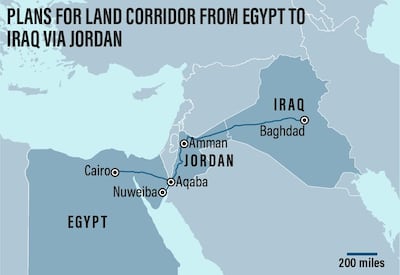
Mr Al Kadhimi's office said the summit would address topics including political and economic co-operation, in particular strengthening investment, and "joint efforts in the fight against terrorism".
As in previous meetings between officials from the three countries, Sunday’s summit ended with no major announcements but Iraqi Foreign Minister Fuad Hussein said the leaders stressed the need to continue discussions on a verity of topics.
They discussed several projects, including establishing an industrial city with Jordan, producing medicine and insecticides, as well as housing and construction, Mr Hussein said.
He said holding the summit amid the current challenges in the region marked a success.
“The leaders of the three countries and the political leaders are continuing co-operation in order to face the challenges and to invest the opportunities, whether in economy and politics,” Mr Hussein said.
Jordanian Foreign Minister, Ayman Al Safadi, said the leaders expressed support to Egypt and Sudan in the Nile dam dispute with Ethiopia, and their support for the Palestinian people to establish their independent state on 1967 borders.
Egyptian Foreign Minister Sameh Shoukry said the next summit would be held in Cairo, but did not set a date.
Sunday’s meeting was supposed to take place in March but was delayed because of a deadly train crash in Egypt that month, and a plot in Jordan involving a former palace adviser to the king, as well as his half-brother.
Previously, the three nations agreed to link up electricity grids to allow the sale and sharing of power to help Iraq reduce its dependence on Iranian electricity and gas imports.
Baghdad must obtain regular sanctions waivers from the US to continue the imports without penalty.
The partners are also working out a deal to export Iraqi crude oil through Jordan to Egypt or to international markets.
Iraq also plans to build an oil pipeline with a capacity of 1 million barrels a day to export crude from Jordan’s Port of Aqaba.
Of that, 150,000 barrels would be supplied to Jordan's Zarqa refinery.


